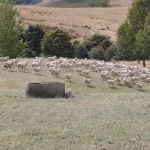
However, they also need to be thinking long-term with more dry-spells looking likely.
Chris Logan, animal programmes manager at Lincoln University, says it looks like the region may be in for a hard drought, not seen for some decades.
''If they don't have other contingencies in place, then farmers really need to be reducing stock numbers to their winter stocking rate as fast as they can. That probably means taking a lower price than they would have liked but at this point, there is not much option. ''
The alternative is that you will have lower lambing percentages next year which means this year's problems simply compound next year, he says.
Logan notes that sourcing off-farm grazing is another option, but it comes at a cost, not only in grazing and transport charges per head, but also due to increased animal health risks when grazed-off animals return. There are also reduced management and nutritional controls to consider.
''Whichever way you look at it, we are in a loss minimisation situation now.''
Professor Tony Bywater, of the Faculty of Agriculture and Life Sciences, says long-term planning is needed.
"The pundits tell us that climate change is likely to increase the frequency of dry periods in the future so farmers really need to be thinking about how their system is set up to cope with variability in weather patterns.''
He says the start of a drought is not the best time to start thinking about how to cope with a dry spell.
"By the time we realise we are in a drought, it's usually too late to do anything about it without it costing an arm and a leg,'' says Bywater.
Farmers need to have flexibility built into their farming systems and know their 'trigger points'. Ask yourself how risk averse you are, he says.
"Whatever your trigger is, when you reach it, act. Don't wait. Our research shows us that if farmers react to their moisture triggers instead of hanging on in the hopes of rain, they will reduce the variability of performance year to year and maintain higher profits over all — quite significantly.''
This depends on having the ability to react, however.
"You either have to have stock you can get off the property quickly or you have to have feed to feed them, there's only two choices."
What farmers need to be looking at are systems, which perform at a high level and have the flexibility to adjust to a dry year without a significant loss in profit.
- Drought
- dry
- losses